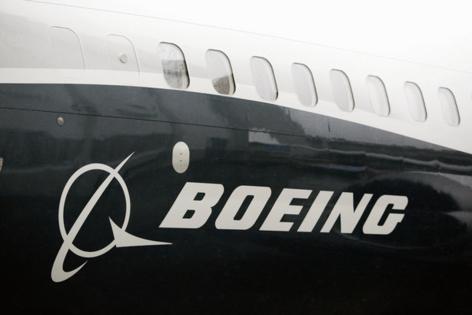Boeing still burns cash, but CEO sees 2025 as 'turnaround' year
Published in Business News
Though still burning through cash, Boeing significantly cut its losses in the second quarter, marking another step forward on its path to recovery.
The company on Tuesday reported a net loss of $612 million, or 92 cents per share, for the three months from April to June.
During the same three months last year — when Boeing was still reeling after a panel flew off an Alaska Airlines 737 MAX 9 midflight, leaving a gaping hole in the side of the plane — Boeing lost $1.4 billion, or $2.33 per share.
Boeing burned through $200 million in cash this quarter, compared with $4.3 billion in the second quarter of 2024. It reported $22.7 billion in revenue this quarter, up from $16.8 billion last year.
In a note to employees Tuesday, CEO Kelly Ortberg said he was optimistic 2025 could be Boeing’s “turnaround year.”
“We are building momentum in our recovery … Together, we’ve notched some important wins reflecting the confidence customers have in our products and services, and we’re taking the next steps to strengthen our culture and improve how we work together,” Ortberg said.
“We’re just over halfway through 2025 and I’m pleased with our progress. Change takes time, but we’re starting to see a difference in our performance across the business.”
Ortberg is coming up on one year as CEO, after taking over from Dave Calhoun in August 2024 in the wake of the Alaska Airlines panel blowout.
Since then, Boeing has regained confidence among airline customers and Wall Street analysts as it continues to ramp up commercial production, with a focus on quality and safety metrics outlined with the Federal Aviation Administration.
The FAA still has a cap on Boeing’s production of the 737 MAX at 38 planes per month, a threshold put in place to ensure the company prioritizes quality over speed, but Ortberg expects Boeing will seek permission to move beyond that threshold this year.
Boeing is also increasing production of its 787 Dreamliner in South Carolina, saying on Tuesday it reached a rate of seven planes per month.
Meanwhile, Boeing awaits FAA certification for new commercial models, including the 777X family and two MAX variants, the 737-7 and 737-10. Boeing on Tuesday confirmed it had delayed its timeline for the new MAX planes to 2026 because of an ongoing problem with the engine anti-ice system.
Ortberg told employees Tuesday that the company was working on a solution but “progress on this solution has taken longer than we expected.”
In the second quarter, Boeing’s commercial airplane division reported $10.9 billion in revenue, an increase from $6 billion in the same three months last year.
Boeing Global Services, which provides aftermarket solutions, saw revenue increase to $5.3 billion from $4.9 billion in 2024.
Boeing's defense and space business reported $6.6 billion in revenue, compared with $6 billion in the second quarter last year.
The defense division did not face any write-offs, bucking its trend of expensive fixed-price contracts and cost overruns eating into its cash flow.
In March, Boeing won a contract to build the Air Force’s future fighter jet, a victory over competitor Lockheed Martin and a much-needed boost for Boeing’s struggling defense business.
In July, Boeing’s defense division marked another victory when the Air Force agreed to buy up to 75 additional Everett-built KC-46 tankers. And Boeing secured a $2.8 billion contract from the Space Force to build two satellites for a satellite communications program.
Boeing now faces the possibility of a work stoppage on its fighter jet production lines in St. Louis and St. Charles, Mo., and Mascoutah, Ill.
On Sunday, 3,200 unionized Machinists rejected the company’s latest contract offer, opening up the possibility for a strike to begin Aug. 4.
In an interview on CNBC Tuesday morning, Ortberg said he didn’t expect the work stoppage to “derail” Boeing’s overall recovery. “This is something we’ll work through,” he said.
This year, Boeing also faced unexpected geopolitical hurdles as it often found itself at the center of President Donald Trump’s international trade war.
Boeing had to navigate the uncertainty of new tariffs that could raise the cost of aircraft parts shipped from around the world and complicate delivery of planes to international customers.
At the same time, it has benefited from some countries placing large aircraft orders to invest in American-made goods and curry favor with the presidential administration.
The latest trade deal between the U.S. and the European Union exempts aircraft and airplane parts from the taxes, providing relief the industry has been calling for since Trump proposed the new tariffs.
“I like the way this tariff situation is working out,” Ortberg said on CNBC Tuesday. “It’s good for our business. It’s good for the aerospace industry in the U.S. It’s going to create jobs and I think that’s what the administration is focused on doing.”
Boeing’s second quarter was largely marked by tragedy after a 787 crashed in Ahmedabad, India, on June 12, killing 241 of the 242 people on board and 19 people on the ground.
With very little information coming from accident investigators for weeks after the crash, aviation safety experts didn’t rule out any possible causes. Initial speculation swirled around the quality of the 787 and its General Electric engines.
It's too soon to know exactly what went wrong, but India’s civil aviation bureau said in a preliminary report this month that there are no recommended actions related to the 787 or GE engines.
Investigators are now focused on the pilots’ actions, after information from the flight data recorder indicated one of the pilots may have cut power to the engines by flipping two fuel control switches.
As the investigation continues, Boeing and GE are limited in what they can say. It could take a year for investigators to release a final report with a probable cause.
©2025 The Seattle Times. Visit seattletimes.com. Distributed by Tribune Content Agency, LLC.












Comments